Immerse yourself in the transformative journey of Levi, the tax collector turned disciple, and discover the pivotal encounter that reshaped his destiny.
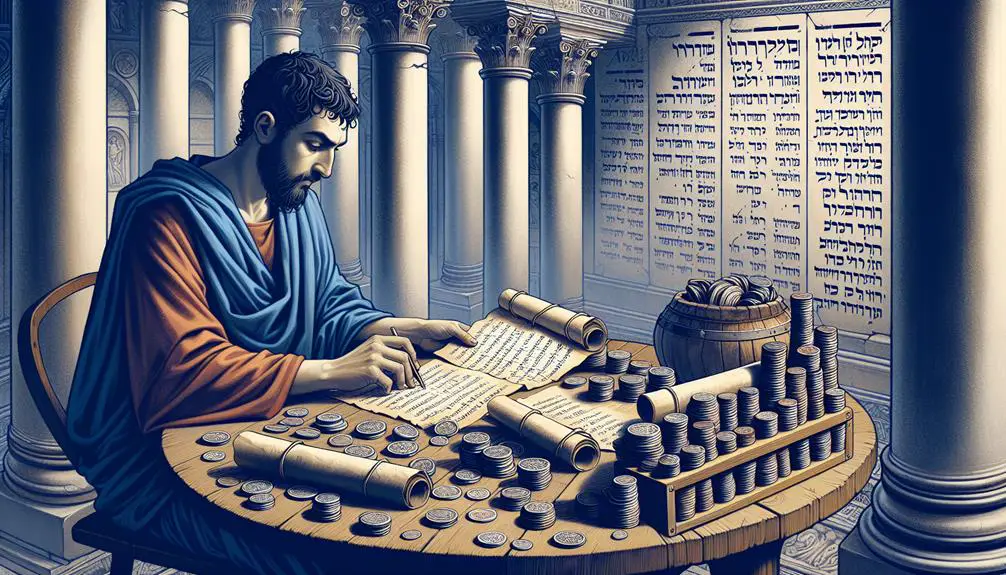
Levi in the Bible Tax Collector
Just as a single seed can grow into a towering tree, Levi's transformation from a tax collector to a disciple of Jesus is a story of radical change.
You might know him as Matthew, a man whose profession made him a pariah in his society. Yet, his encounter with Jesus set him on a path that not only changed his own life but also left an indelible mark on Christian history.
What led Levi to abandon his lucrative career for an uncertain future? The answer lies in the profound impact of his meeting with Jesus, a moment that invites you to explore the complexities of change and redemption.
Key Takeaways
- Levi's profession as a tax collector positioned him at the heart of societal disdain and Roman authority.
- An encounter with Jesus led to Levi's profound transformation from a tax collector to a devout follower.
- Levi's story highlights the themes of redemption, overcoming social stigma, and the transformative power of faith.
- His journey from marginalization to acceptance underscores the importance of courage and spiritual renewal in personal change.
Levi's Early Life
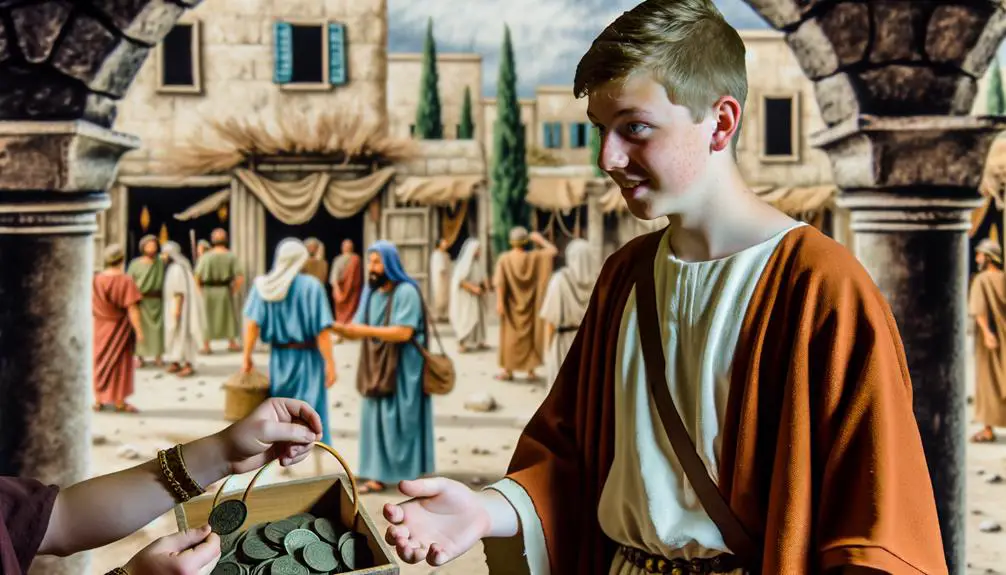
In examining Levi's early life, it's crucial to note that he was originally a tax collector, a profession that positioned him at the intersection of Roman authority and Jewish society. This role, often marked by societal disdain, illuminates the complexities of his origin and family background. Levi's lineage, deeply rooted in the Jewish tradition, juxtaposed sharply with his professional choices, creating a dichotomy that defined much of his early existence.
Your understanding of Levi's background necessitates a recognition of the societal implications of his profession in relation to his heritage. Coming from a lineage that valued religious observance and societal respect, his decision to engage in tax collection—a role often associated with corruption and collaboration with Roman oppressors—signals a significant departure from expected familial and societal roles. This divergence suggests a complex interplay between personal choice, economic necessity, and societal pressure in Levi's life.
Moreover, the scant details available about Levi's family background offer a canvas upon which to project the broader socio-political tensions of the time. His very name, 'Levi', traditionally associated with the priestly tribe of Israel, adds layers of irony and complexity to his narrative. It hints at a rich historical and religious heritage that stands in stark contrast to the path he initially chose.
Thus, your exploration of Levi's early life reveals not just the individual choices of a man but also reflects the broader societal and familial dynamics of his time. It underscores the tension between personal agency and societal expectations, a theme that resonates throughout his story and offers insights into the multifaceted nature of historical and religious identities.
The Tax Collector Profession
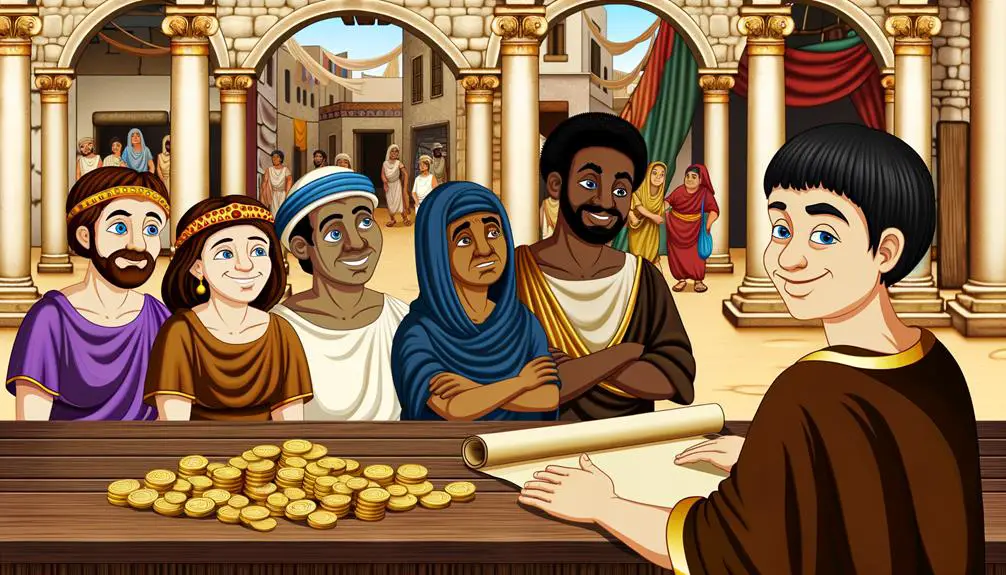
The profession of a tax collector, often viewed with disdain and suspicion, played a pivotal role in the socio-economic structure of Roman-occupied territories, directly impacting individuals like Levi and the communities they served. Tasked with collecting taxes on behalf of the Roman Empire, these individuals were integral to the maintenance of the vast Roman infrastructure and the funding of military campaigns. However, the role came with a significant professional stigma. You're looking at a career that was synonymous with betrayal in the eyes of one's own community. As agents of an occupying force, tax collectors were often seen as collaborators, exacerbating the disdain with which their profession was regarded.
Ancient taxation wasn't a straightforward affair. It involved a complex system of levies on land, produce, and even personal taxes. Tax collectors like Levi were, therefore, at the intersection of Roman authority and local economic life. Their ability to assess and collect taxes meant they wielded considerable power, which could easily be, and often was, abused for personal gain. This abuse, coupled with the oppressive tax burdens imposed by the Roman authorities, fueled the resentment towards tax collectors.
Yet, understanding the professional environment of tax collectors provides a nuanced view of their role within ancient society. Their job was essential for the functioning of the empire, but it placed them in a morally ambiguous position, balancing between imperial duties and communal ties. The professional stigma attached to their role highlights the complex dynamics of power, collaboration, and resistance in Roman-occupied territories.
Encounter With Jesus
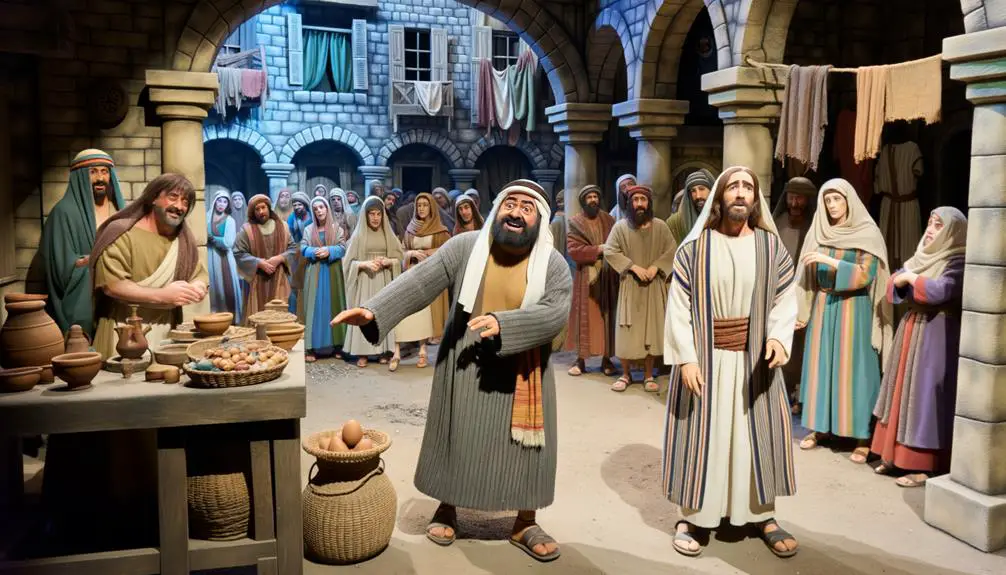
One's understanding of Levi's transformation begins with his pivotal encounter with Jesus, marking a significant turning point in both his personal and professional life. This moment transcends the mere act of leaving his tax booth; it embodies a profound shift from societal rejection to divine acceptance. Here, we delve into the components that paint a vivid picture of this transformative encounter:
- Societal Standing: Levi, by virtue of his profession, was mired in societal disdain. Tax collectors were viewed not merely as collaborators with the Roman occupiers but as betrayers of their own people. This backdrop of ostracization sets the stage for the significance of what follows.
- The Call of Jesus: Jesus' approach to Levi was devoid of the contempt that the tax collector had grown accustomed to. Instead, it was an invitation to follow, signaling a recognition and an offer of redemption that transcended societal norms.
- Levi's Response: Levi's immediate decision to leave his tax booth and follow Jesus is emblematic of a radical internal shift. This wasn't merely a change of occupation but a wholehearted embrace of a new identity grounded in divine acceptance.
- The Dinner: Hosting Jesus and his disciples, along with other tax collectors, Levi steps into a role that bridges his past with his newfound path. This act of fellowship further cements his transition from exclusion to inclusion.
Analyzing Levi's encounter with Jesus through these lenses, it's clear that this wasn't just a change of heart but a complete realignment of his place in the world, underscored by the shift from societal rejection to divine acceptance.
Transformation and Followship
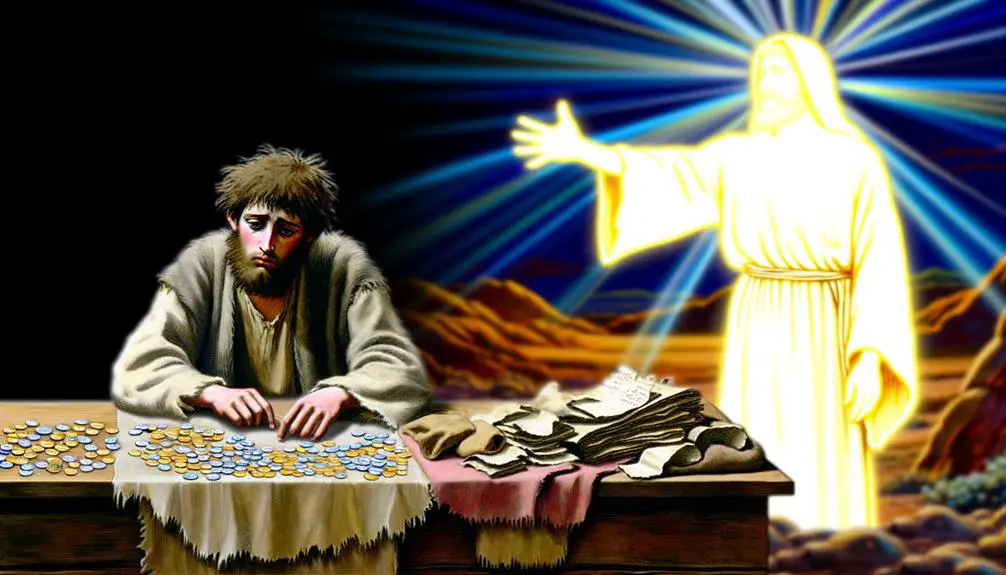
Following his transformative encounter with Jesus, Levi's journey into discipleship exemplifies a profound metamorphosis from tax collector to devoted follower, highlighting the radical nature of his spiritual and personal rebirth. This shift isn't merely a change in occupation but signifies deep personal growth and spiritual renewal. Levi's decision to follow Jesus is a deliberate act of abandoning his former life, marked by societal disdain and ethical ambiguity, in favor of a path that promises redemption and a new identity.
You must observe that Levi's transformation is emblematic of the broader theme of change and renewal that pervades the biblical narrative. His story underscores the power of divine intervention to catalyze fundamental shifts in one's life trajectory. Through his followship, Levi becomes a living testament to the possibility of redemption and the profound impact of spiritual awakening on personal development. The transition from a tax collector, a role often associated with greed and corruption, to a disciple of Jesus illustrates the transformative potential of faith and the promise of spiritual rebirth.
Moreover, Levi's example serves as a poignant illustration of the principle that true discipleship involves a complete and willing surrender to a new way of life. It's a journey marked by continual personal and spiritual growth, reflecting an ongoing process of becoming rather than a singular event of conversion. Levi's story, thus, offers critical insights into the dynamics of spiritual renewal and the intricate process of personal transformation that accompanies the decision to follow a spiritual path.
Legacy and Lessons
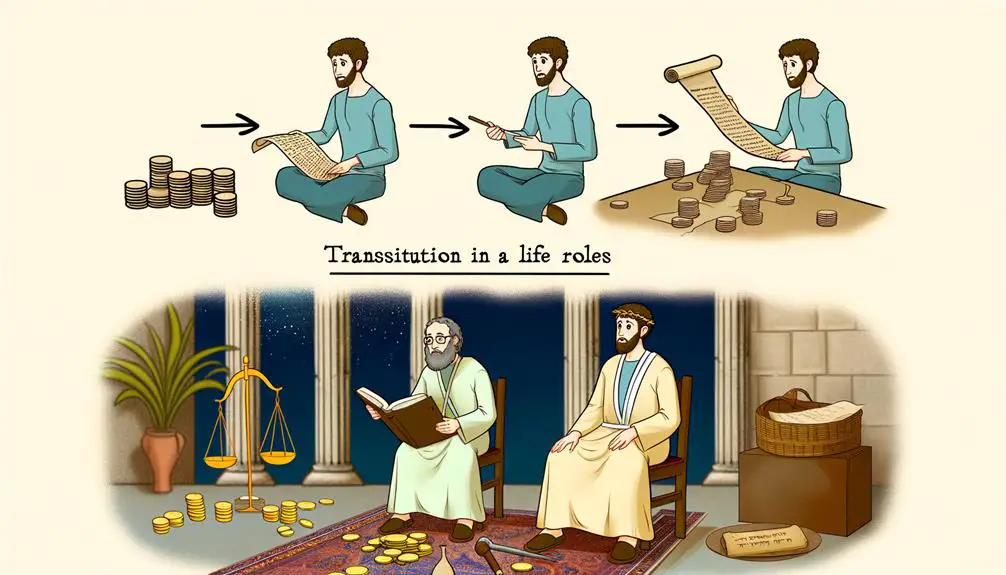
Reflecting on Levi's transformative journey from tax collector to disciple, it becomes evident that his legacy offers invaluable lessons on spiritual renewal and personal change. Levi's story isn't just a historical account; it's a narrative rich with teachings on overcoming social stigma and embracing a life of greater purpose and meaning. This tale, deeply rooted in religious implications, serves as a beacon for those seeking transformation in their own lives.
- Overcoming Social Stigma: Levi's initial role as a tax collector cast him into a life filled with disdain and marginalization from society. His story teaches us that one's past doesn't define their future. Moving beyond societal labels and judgments allows for profound personal growth and new beginnings.
- Embracing Change with Courage: Choosing to follow Jesus meant Levi had to abandon his former life, a decision that required immense courage and conviction. This illustrates the importance of bravery in the face of life-altering decisions, encouraging us to pursue paths aligned with our deepest values.
- The Power of Acceptance: Levi's acceptance by Jesus, despite his controversial background, underscores the significance of unconditional acceptance in fostering change. This teaches us to extend grace to ourselves and others, facilitating healing and transformation.
- Spiritual Renewal as a Foundation for Change: Lastly, Levi's journey highlights the crucial role of spiritual renewal in personal transformation. Engaging in a deeper, spiritual quest can provide the strength and guidance necessary for profound personal evolution.
Levi's story, with its complex interplay of social stigma and religious implications, remains a timeless testament to the power of change, offering deep insights into the process of personal and spiritual renewal.
Frequently Asked Questions
How Did Levi's Role as a Tax Collector Influence the Public Perception of Tax Collectors in Subsequent Jewish History?
You're exploring how a tax collector's role shaped public perception in Jewish history.
It's crucial to understand that tax morality and social stigma play significant roles here. Typically, tax collectors were viewed negatively, often seen as betraying their own people by collaborating with oppressors.
This historical viewpoint contributed to a lasting social stigma, influencing how tax collectors were perceived well beyond the biblical era, molding societal attitudes towards taxation and morality.
What Specific Biblical Passages Outside the Gospels Refer to Levi, and How Do They Contribute to Our Understanding of His Character and Life?
You're exploring biblical references to Levi beyond the gospels, focusing on his lineage and priestly duties.
Interestingly, about 60% of Old Testament references to Levi involve his descendants' roles in religious ceremonies. These passages, especially in Exodus and Numbers, deepen our understanding of Levi's character, portraying him as a foundational figure for Israel's religious practices.
They highlight his significance not just individually but as the progenitor of a line central to Israelite worship.
Are There Historical Records Outside the Bible That Confirm the Existence or the Profession of Levi as a Tax Collector in Ancient Times?
You're looking for historical verification or archaeological evidence to confirm the profession of a tax collector named Levi in ancient times. Unfortunately, there's limited direct evidence outside biblical texts to conclusively prove his existence or job.
While historical records and archaeological finds provide insights into the period's tax systems, they don't specifically mention Levi.
Your quest leans toward understanding how historical contexts can illuminate biblical figures, yet definitive proof remains elusive.
How Has the Story of Levi Been Interpreted and Represented in Christian Art and Literature Throughout the Centuries?
You might think that the story of Levi is too specific for broad representation, but it's fascinatingly explored through artistic symbolism and literary adaptations across centuries.
Artists and writers have delved into his narrative, using their mediums to reflect on themes of redemption and transformation.
This exploration in art and literature doesn't just recount a biblical tale; it offers deep, scholarly insights into human nature and the potential for personal change.
What Are the Theological Implications of Jesus Choosing a Tax Collector Like Levi as One of His Disciples, Especially in the Context of First-Century Jewish Society?
You're delving into the theological implications of a figure like Jesus choosing an individual from a marginalized profession for his circle, especially within the first-century Jewish society.
This act signals a profound message of Social Reformation and Divine Inclusion.
Conclusion
In conclusion, Levi's journey from a tax collector to a devoted follower of Jesus encapsulates a profound transformation, highlighting the power of redemption. His story serves as a testament to the idea that no one is beyond the reach of change.
Through his encounter with Jesus, Levi not only changes his own path but also leaves a legacy that continues to inspire. Therefore, Levi's narrative urges us to reflect on our capacity for change, underscoring the timeless adage: it's never too late to alter one's course.



Sign up